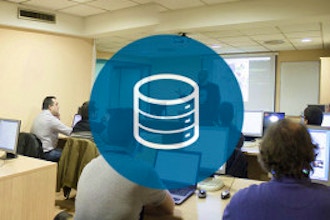Discover the Best SQL Classes in Boston
SQL is used to manage and manipulate relational databases and provides a standardized way to interact with databases and perform operations. It was created in the 1970s by IBM researchers and is generally user-friendly.
Individuals may want to learn SQL for different reasons. Learning SQL provides a toolset for managing, analyzing, and manipulating data. It can improve data-related skills and problem-solving abilities and increase value in the professional world.
Once individuals learn SQL, they can use their skills across different platforms, like Oracle, MySQL, Microsoft SQL Server, and PostgreSQL. They also enhance their career prospects. Organizations rely on databases to store and manage their data and need those well-versed in SQL to work as Data Analysts, Data Engineers, Database Administrators, and Business Analysts.
Best SQL Classes & Schools in Boston
NYIM Training, one of Noble Desktop’s affiliate schools, offers SQL Level I online. The course covers the fundamentals of SQL and relational databases. Individuals can start writing SQL queries to understand the information stored in databases. The course focuses on hands-on exercises and guides individuals through understanding database architecture and developing skills in writing SQL code. Other skills covered include writing select statements, using wildcard filters and mathematical comparisons, and combining data from multiple tables with inner JOINs.
SQL Level II is another course offered by NYIM Training. Individuals expand their skills and learn how to group data with aggregate functions. The intermediate course enhances individuals’ skills to join, filter, group, and analyze data. Some key skills taught include using Outer Joins and finding NULL data, filtering grouped data with HAVING, and using CAST to make a data type fit a query’s needs. Individuals dive into the functions and features that make SQL easier to use.
Noble Desktop also offers SQL Levels I and II online. SQL Level I covers how to write SQL queries, primary SQL clauses including SELECT and FROM, filtering results using WHERE, AND/OR, IN, and NOT, wildcard filters, and combining information from multiple tables. SQL Level 2 builds on the knowledge learned in SQL LEVEL 1.
Boston Industries That Use SQL
Several thriving cities in Boston rely on SQL for data management and analysis. Some of these industries include Finance and Banking, Technology and Software Development, and Education and Research. Top SQL companies in Boston include Tulip, Liberty Mutual, MineralTree, Laudio, and Veeva.
The Finance and Banking industry uses SQL for data and storage retrieval, querying and analysis, and data integration and consolidation. SQL databases provide a structured way to organize customer information, transaction records, and account balances. It queries and analyzes financial data for various purposes and merges data from multiple sources.
The Technology and Software industries use SQL for database management. SQL is the standard language for software applications, and Developers use it to create, modify, and maintain databases. SQL queries are used to retrieve data from databases based on specific criteria, and SQL is employed for reporting in software applications.
SQL is used to manage educational institutions and plays a crucial role in managing research data in research institutions. It is employed in managing course and curriculum data and is used to generate reports for institutional reporting and compliance.
SQL Jobs & Salaries in Boston
There are various SQL jobs available for individuals in Boston. These positions include SQL Developer, Database Administrator, Data Analyst, and Business Intelligence Developer. The annual salary range for these positions spans from $70,000 to $130,000.
SQL Developers write and optimize SQL queries and work with database management systems. They make between $70,000 and $120,000 annually.
Database Administrators make up to $130,000 annually and manage and maintain databases. They ensure data security and integrity and optimize database performance. They typically work in firms that provide computer design services or industries that have large databases. According to the Bureau of Labor Statistics, the projected job outlook for Database Adminstrators from 2021 to 2023 is 9%, which is 4% faster than average.
Individuals interested in building data models, designing and developing data warehouses, and creating interactive dashboards and reports can look into becoming Business Intelligence Developers. They make up to $130,000 annually and use SQL and BI tools.



























